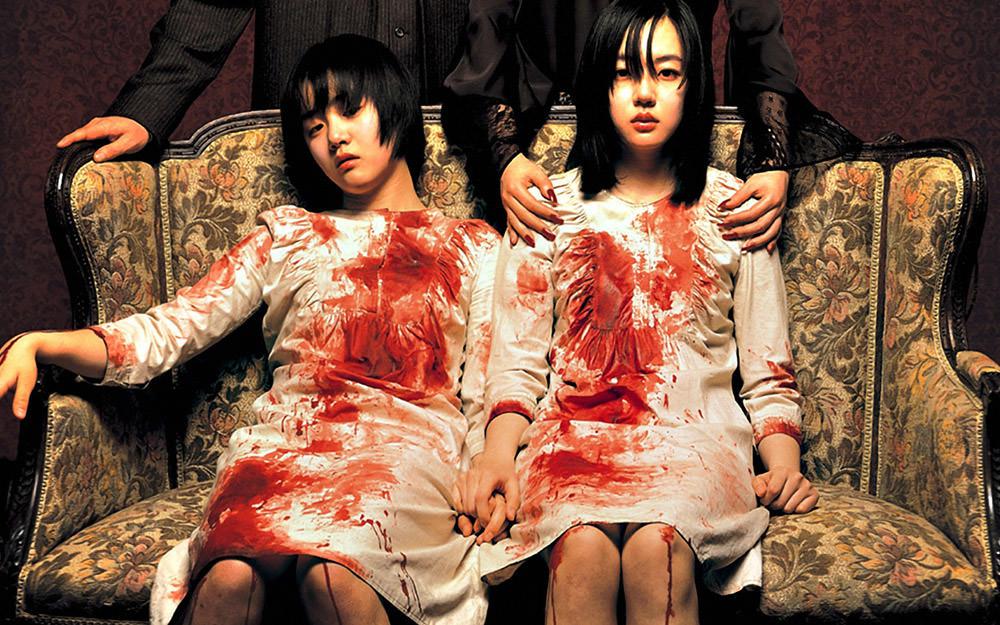A Tale of Two Sisters by Kim Ji-Woon (Review)

Todd over at Twitch has been raving about this film almost nonstop, so much so that I picked up a copy when I was in Toronto (gotta love those 6 DVDs for $30 deals in Chinatown)… and promptly set it on my shelf where it has been gathering dust ever since. I’m not really sure why I took so long to watch it. I’m sure part of it has to do with the fact that I’m not much of a horror fan, though A Tale of Two Sisters is most definitely not a retread of the Ring/Ju-On formula that’s been done to death these days. And I also suppose part of the reason is my natural skepticism about films that have received heaps of praise, and that is definitely the case with A Tale of Two Sisters.
But in all honesty, it does deserve quite a bit of that praise. For starters, the film is just absolutely gorgeous to watch. Writer/director Kim Ji-woon (who first burst on the scene with The Foul King) shoots some beautiful film, especially inside the house in which the film is set. He loves to capture the textures and patterns throughout the house, leading your eye into the background where the scares often happen. And unlike many horror directors, he’s not afraid of suffusing his scenes with bright sunlight, creating cheery, nostalgic scenes that are promptly turned inside out.
The film’s plot is something of another matter. The film follows two sisters, Su Mi and Su Yeon, as they return to their country home and attempt to settle back into normal life. The youngest sister, Su Yeon, is rather frail and sickly, reliant on Su Mi for strength and guidance. Which she needs in the face of their stepmother, who is by turns cold and cruel. Their father, who remains distant and stoic at the dinner table, is of no help and the sisters, who are already close, have nowhere else to turn but eachother for solace.
And to make matters worse, their lovely country home soon grows less and less inviting. Both sisters begin having strange visions and hearing strange noises, and the constant friction with their stepmother, who grows increasingly abusive, begins pushing things to its boiling point.
As the film progresses, the storyline becomes more and more fragmented. Soon, it’s difficult to tell what’s happening is real, or merely a dream, nightmare, delusion, or something else. Kim has apparently never met a twist he didn’t like, and the film’s third act is full of them, some good and some bad. The good news is that the standard twists, the ones you know are coming, often tend to get subverted and twisted into something else entirely. Although, in hindsight, the film doesn’t really bring anything new to the table in terms of plot twists, the execution is handled incredibly well.
On the downside, there are just a few too many twists thrown out. The film arrives at what could be a very satisfying conclusion that wraps up most of the film’s twists and loose ends. Unfortunately, it doesn’t stop there. In my estimation, the film runs just about 15 minutes too long. Rather than wind down with a nice denouement that might flesh out the ending and give it even more resonance, the film throws out just a few more twists for added effect, which serves only to muddy up the film unnecessarily. (The film’s final 5 minutes or so are especially troublesome, and seem to come completely out of left field.)
As for the scares, well there are quite a few. Previous to A Tale of Two Sisters, Kim directed the “Memories” segment in the Asian horror anthology Three. As he did with that film, Kim packs A Tale of Two Sisters with atmosphere and tension to spare.
While there are several quick scares, the more effective ones are those that he drags out and adds layers to, such as Su Mi’s first truly disturbing vision, which goes on and on and becomes increasingly freaky and surreal. Those expecting something long the lines of Ju-On might be disappointed. A Tale of Two Sisters feels more similar to Dark Water, in both its atmosphere and style, and on its focus on building up actual characters as opposed to ghost fodder.
With each film, Kim seems to grow and grow as a filmmaker. The Foul King left me a little underwhelmed, but had flashes of brilliance. Memories was a real treat, albeit a very disturbing one. And A Tale of Two Sisters, while not as effective as Memories, shows a further development of Kim’s style. His latest film, the crime thriller A Bittersweet Life has just come out, and it seems to be receiving nothing but accolades so far. Hopefully, I’ll be more on the ball when it comes to seeing that film, rather than waiting months before finally getting around to it.
